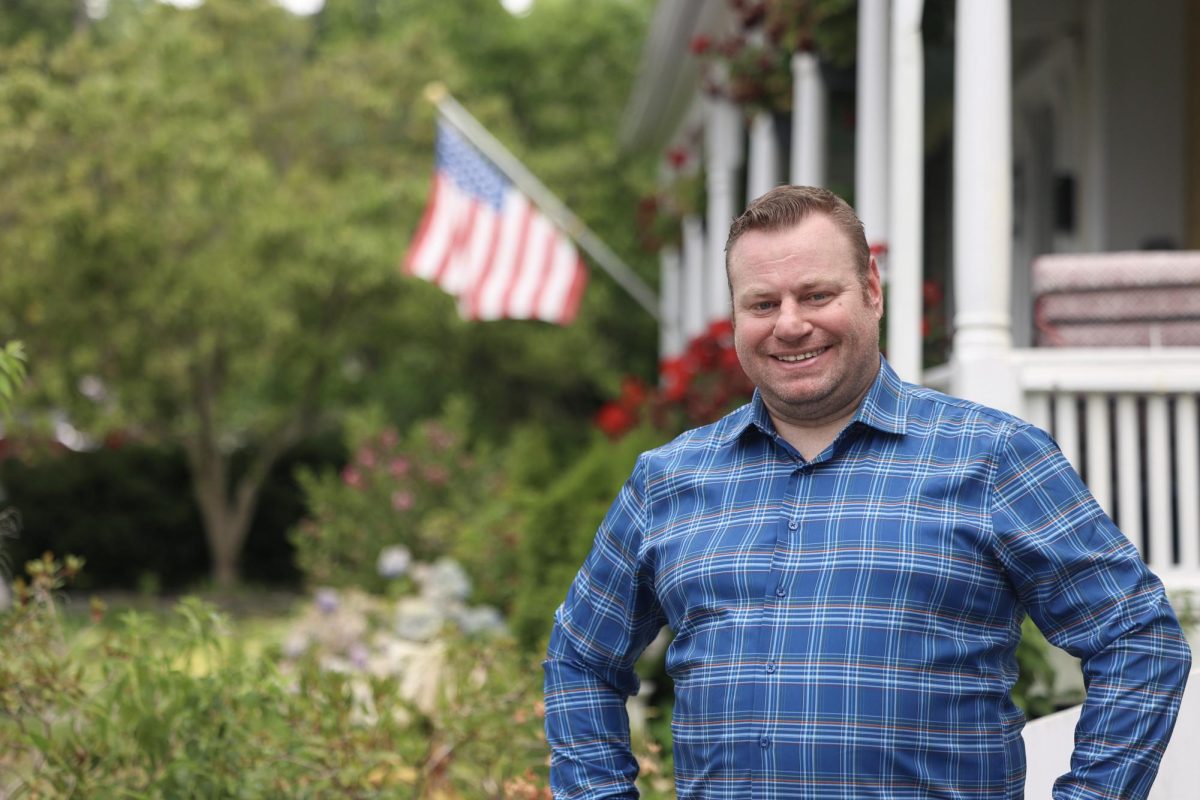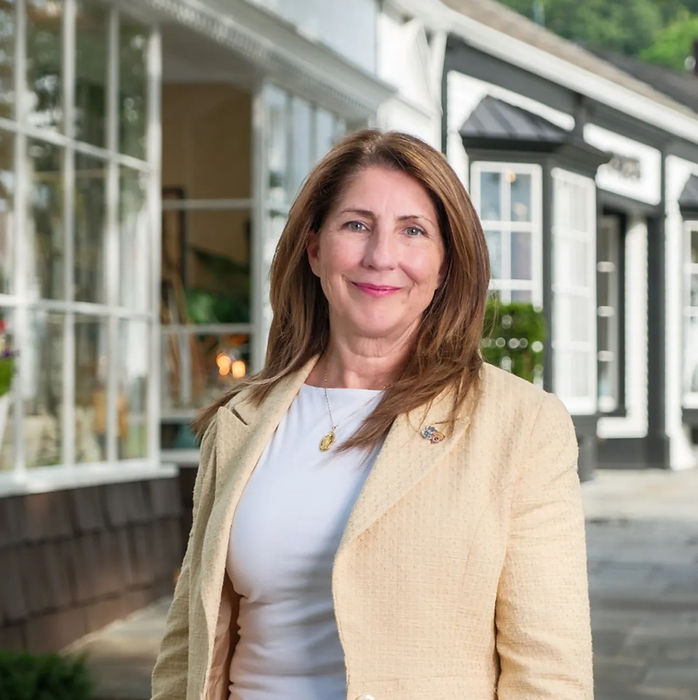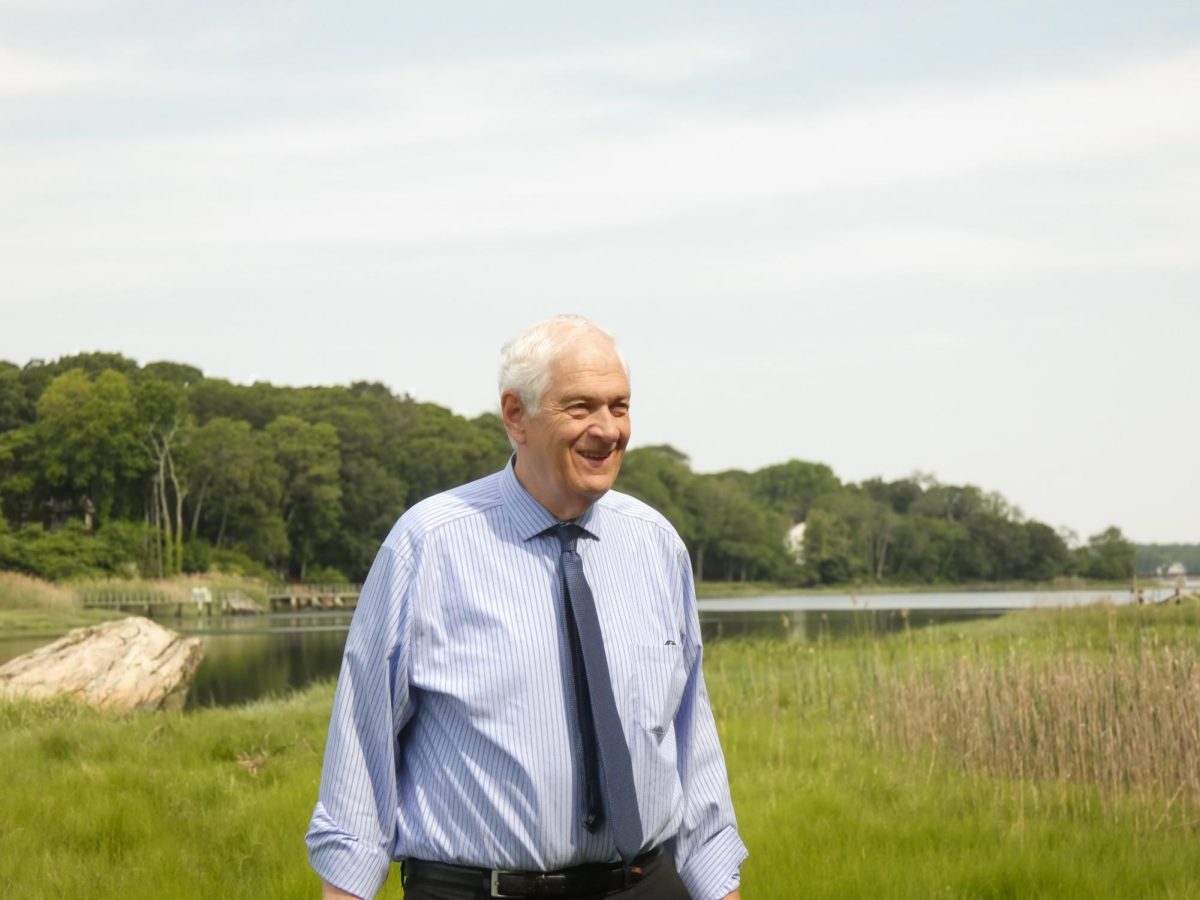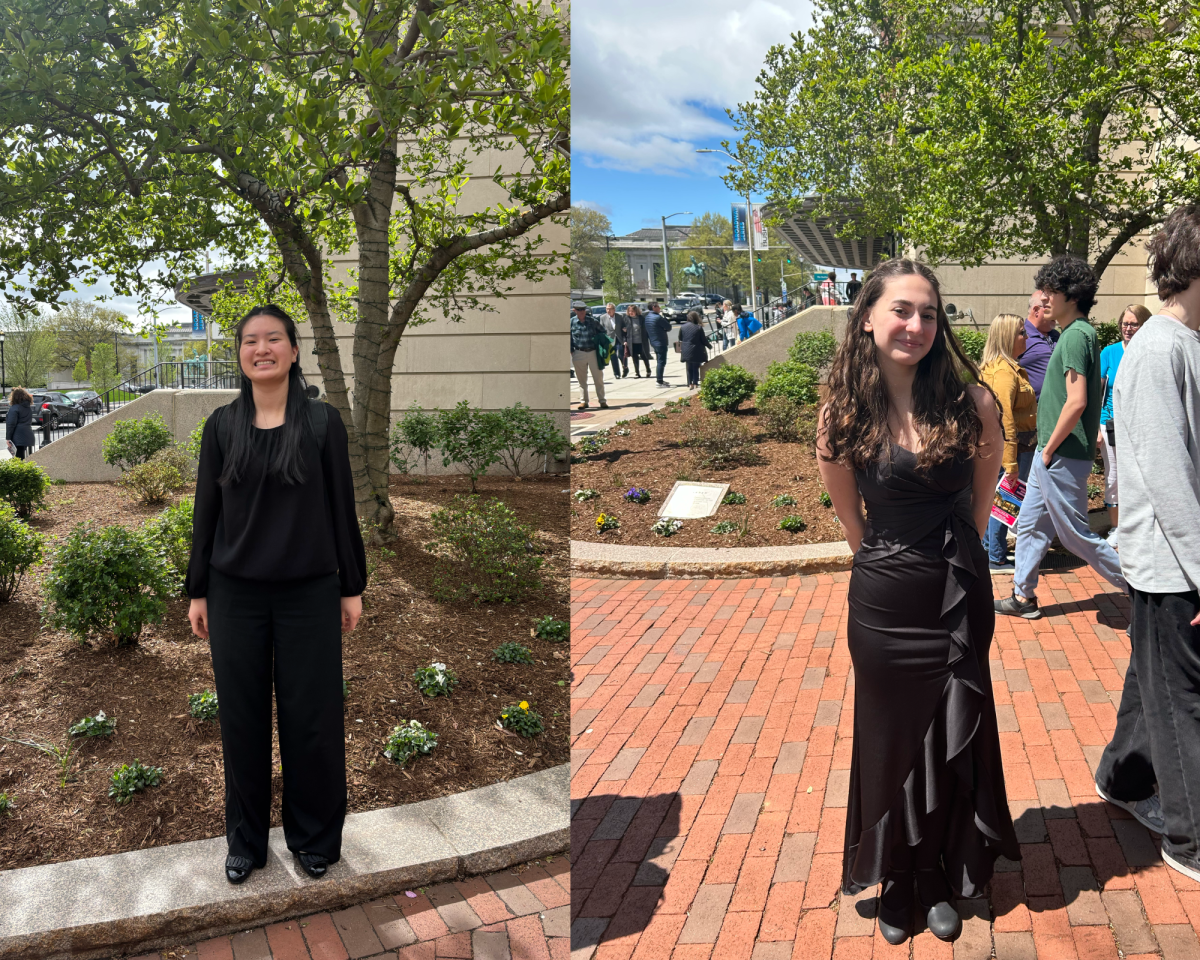Ed Flood is seeking reelection in the 4th Assembly District. Prior to his election in 2022, he served as the Chief of Staff to then-Assemblyman Dean Murray, and he owns a law firm in Port Jefferson*. He is a Republican and is being challenged by Democrat Rebecca Kassay. Below is the full transcript of our interview with him, lightly edited for clarity. [*Editor’s Note: On September 25, 2024, after this interview was initially published, Assemblyman Flood was disbarred from practicing law in New York by the Second Appellate Division court in Brooklyn, saying he neglected two clients and “engaged in conduct involving dishonesty, fraud, deceit, or misrepresentation.”]
What are you most proud of from your first term in office, and what will be your priorities if reelected?
Probably my most successful thing is I’ve been able to get a bunch of grant money to help some really deserving communities. The Gordon Heights Fire Department is the highest taxed fire department in the state because there is no commercial tax base. I was able to get them a $75,000 grant to help fix their roof, which means that’s $75,000 that the taxpayers don’t have to foot the bill on. I gave another $75,000 to the V.F.W. Hall over in Setauket. They had some decaying infrastructure and that group uses that facility a lot. A lot of good stuff comes out of there and it’s used by multiple organizations.
On the legislative side, I have a bill that’s called Gabby’s Law, which is in honor of Gabby Petito. Right now, we have our Amber Alert, which is able to go out when children go missing, and we have our Silver Alert, which goes out when we have seniors missing. We have nothing for when you have someone between the ages of 18 and 65 missing. What my bill would do is it would allow family, friends, people to notify the police and say “Hey, even though this person’s an adult and perceived to know what they’re doing, their behavior or their going missing is way out of character from what their norm is.” It would allow us to lock in as a federal system, and we would just have to adapt into it, and we can let that alert go out. That’s still pending in Albany right now. We got a little pushback, but I’m able to work with people from both sides of the aisle and hopefully this upcoming session, we can get something done.
In terms of goals, this is my first term in office, so I’m just finishing up my first term, and I ran on the premise of trying to make New York safer and more affordable. Right now, it’s an extremely expensive place to live in the country. For comparison, New York’s budget this year is $236 billion. That’s more than the state of Florida and the state of Texas combined*; both states now exceed New York’s population. Florida has more people than us, so does Texas, and our state budget is double what theirs is. That’s why, when you talk about people saying it’s much more affordable, and you’ll see it as you guys get a little older, a lot of your friends will leave college and not come back. New York has the highest out migration in the country, meaning that more and more people leave New York State than anywhere else in the country. [*Editor’s Note: The validity of the claim that New York’s budget is more than that of Florida and Texas combined is unclear. From what we can tell, New York’s budget for the fiscal year 2024-25 is $236.8 billion. Florida’s is $116.5 billion. Texas’ budget from September 1, 2023 to August 31, 2025 is $321.3 billion, averaging to $160.65 per year. These two figures added together total to $277.15 billion.]
And New York has become a less safe place; we’ve done these criminal justice reforms where I think some were definitely necessary. And just so you know, a little background of mine, I am an attorney by trade. I was a prosecutor for the Town of Brookhaven prior to coming up here, but out of law school, I did criminal defense work for a long time, so I’ve seen both sides of that aisle. I believe there were some, but we went so far that you pick up the newspaper any day and you see someone that’s been arrested 15 times again, arrested for some violent heinous crime, and is out on bail because we can’t hold them. I think we need to change some of those laws, tweak that so that it becomes common sense.
Part of those reforms were that when a defendant came into a criminal court, a judge had discretion to determine whether that individual is a danger to society, and that could be a part of a bail application. New York got rid of that standard, and now you can only be held on basically murder, rape, violent felony arrests. You think of the drug trade, and you know, people get killed all the time; in order to be held on bail for a drug offense in New York, the weight has to exceed over a million dollars in street value. I think we need to tinker with that a little bit, because now, 49 states in the country allow judges to determine the dangerousness of an individual. New York is the only one that doesn’t. So from when this bill was passed in 2019, from roughly 2020, to now, you’ve seen tons of low level offenses go where they’re shoplifting.
You’re seeing more and more overdoses, because as a criminal defense attorney, I see this. I got people caught on drug charges, and a judge could say, well, here’s what I can do. I can either remand you, meaning I’m sending you to jail for 30 days, or you can enter into an outpatient facility, so a lot of people were getting treatment that they were unwilling to get. Right now, a judge can’t do that. So you’re arrested on a possession charge, say you have a heroin or an opiate addiction. The court used to be able to make you go get treatment. They can’t now. The other thing is it used to be, if you were missing court, they could come arrest you and hold you until the proceedings were done. That’s not a thing anymore. Missing court is not even a bailable offense, so you can get arrested and just never show up to court and nothing’s going to happen to you. So you’ve seen a huge increase. We’ve talked to people who are running the drug rehabilitation centers, pastors, school officials, and you see that massive increase because there’s no legal avenue for the justice system to force people into treatment. That’s something we’re going to take back up come January.
Mill Pond and other areas of our district were destroyed in flooding last week. What are you doing to respond to this, in the short term and long term?
I woke up to it just like everyone else did on Monday morning. I was at the scene within probably 25 minutes of me getting that phone call. I was working in my state capacity with the town supervisor Dan Panico, our county executive, Ed Romaine, members of Nick LaLota’s staff, our Congressman, and we had members from Chuck Schumer’s team. They came down, working all together to call on the Governor to declare a state of emergency. Before any funding mechanisms, whether it’s state or federal aid, come in, you need first for that to happen. Governor Hochul had been away at the DNC on Sunday, so it was kind of delayed getting her to come in and fix it, but she did declare it on Friday. President Biden also declared it on Saturday.
Right now, it’s a matter of getting that funding in place and working with our local partners. There’s going to be DEC (Department of Environmental Conservation), we have the Army Corps of Engineers when we’re dealing with water and things that empty out into waterways, like Mill Pond has a creek that goes into the Sound. So we have all these agencies that we’re gonna need to obtain permits from; we’re working with that process. The first thing is getting all the money in order for FEMA to come in. There’s a minimum threshold of $37 million in damages; we’ve well exceeded that right now. As of Friday, we were saying roughly around $75 million is gonna be needed. And every time things keep popping up, you’re getting more and you’re gonna increase that bill.
The other part of that is the homeowners who have been affected. We’ve been sharing on social media and to everyone who’s ever called. We have a link so that they can start reporting their damages to the county and the state just released our plan for that. It’s a matter of getting it out there to our district to let them know if there was damage, these are the steps you need to start to take.
How aggressively do you believe the state should be acting on climate change, which is a major issue for many young people? What is your stance on offshore wind development off of the East End?
The first thing is, New York State is one of the most progressive states in terms of combating climate change. I think we need to take steps that can ensure we switch to renewable energy. Infrastructure wise, we’re not there. As we go there, we need to make decisions that are environmentally sensitive but are also pragmatic so that we don’t come up with a lack of energy. We can’t have people’s heat turning off in February because we’ve transitioned too early, and now we don’t have enough juice to keep the load going. We’ve invested tons of money. We have the CLCPA (Climate Leadership and Community Protection Act), which is our environmental goals, which talks about being 40% fully green by 2030, and by 2050, 100%. Governor Hochul just came out and said we’re not going to hit the 2030 goals, which is not surprising because this is a massive undertaking; it’s a massive amount of money, and it’s a massive amount of raw materials of which we really don’t mine here ourselves. There’s some issues with how we get them. I think everyone’s on board with saying we need to get there, but there’s some pushback saying let’s be smart while we get there.
With offshore wind, it’s a little difficult because we had all sorts of projects, but for two of those major deals, people have pulled out. After 2020, when we had the raw materials problem and the cost of living and everything went up, raw materials went up. After the pandemic, two of these companies said we can no longer operate under this set of money and so they’ve pulled out of those projects. My personal opinion is I think it’s a great idea, but again, right now the cost of it seems to be exorbitant. Like I said, the state was in contract to do that but the contractors pulled out because under the terms of the contract, they said we can no longer really afford to do this project.
A leading concern for voters is the high cost of living and housing. What do you think should be done to address these issues?
Like I said, I think we need to cut from the budget because our taxes are extremely high. Take the area around here, like Setauket. The average property tax bill is probably somewhere around $16,000-$18,000 a year. Contrast that with North Carolina or Florida, where you’re paying about $3,000 a year. We also have the migrant crisis going on right now. We have hundreds of thousands of people flooding into New York City with no housing. They’re getting housing from the city, which is also creating a scarcity amongst residents looking for housing. When a scarcity happens, you have an increase in price because everything goes up.
First thing is, New York State has to do a better job of how we spend our money. We need to cut spending at some point. We can’t sustain this level of debt and this level of spending. Like I told you guys before, look how much we spend compared to other states. That’s going to drive the cost up high, because we’re also one of the highest taxed states in the country. In addition to your property taxes, we also have an 8.5% state income tax. States like Florida have zero. Texas has zero. The Carolinas have 1.5% to 2%. We’re already taking money out of the pockets of our people, so where we can have really high salaries, your money, your expendable income, is substantially less because you’re spending more. For the cost of energy, we spend more on oil, gas, electric than most of the world.
To be honest, we need to do things to reduce that in the short term. How we get there is overly complex, but the biggest thing I’d say from the beginning is we need to cut expenses. Because if we cut expenses and give more money to the taxpayers, we also have to understand that we need to build some more. But like I was explaining before, even though it seems like our demand for housing is going up, our population is going down. So we need to do a better job of how we how we repurpose our buildings. We have lots of housing that’s just decrepit and can’t be used. Whether it’s how we go in and repair, I think we can’t just have an open door policy where we tell the world anyone in the world can come here and we’re going to give you housing, food, clothing. It’s skyrocketing the price. Over the last two years, under the state budget, we’ve allocated $4.3 billion towards the migrant crisis. At this point, it’s already exceeded over $5 billion, so we’re already $800 million over budget this year, and we’re not done yet. I think we need to make difficult decisions, and we have to cut funding for some programs.
We have to do a better job of not wasting money. We have to put money into the right places like creating infrastructure that can support jobs, can support new housing. But we’ve just got to get the cost of living down because it’s making it impossible for the average person. Right now, Suffolk County, the median house sale is for about $650,000 at an 8% interest rate. We need to do better on how do we lower the interest rates down? How do taxpayers keep more dollars in their wallets?
There’s been a general trend of young people moving out of the district over the past decade and school districts have struggled with declining enrollment. What should be done to counter this?
Like I said, it’s all about we have huge out migration because New York State is a very difficult state to live in. Homeownership in New York State for a young couple, for a young person or a young family, is extremely expensive. It’s very difficult. So one, we need to reinvest in some of the newer technologies. Like Governor Hochul had said, we want to be the innovator, we want to be the AI hub of the world. But then she turned around and said, well we’re going to cut school funding, and we’re going to cut Foundation Aid. The Three Village district was going to lose about $8.9 million so we spearheaded an effort to say, hey, we can’t spend this much money, talk about being the best, and then cut the money from the programs, because that’s the first thing that’s going to go. You’re going to lose your STEM programs, everything will just go back to state standards.
This is not how you make excelling programs. We need to, instead of flittering money away on a lot of social programs, invest that money into infrastructure programs that are going to train our youth into these new high tech, high paying jobs of AI, and ensure that we have the jobs available to keep our young people here. We also need to deal with safer streets and make things more affordable because the only way we’re going to incentivize people to stay is with good paying jobs and an ability to raise a family and have that American dream of home ownership.
Earlier this year, you spoke at a Three Village Central School District press conference to oppose Governor Hochul’s proposed state funding cuts to schools including Ward Melville. Do you think changes to the Foundation Aid formula are necessary in the future?
There’s going to be some changes, but how we fund schools is extremely complex. There’s over 100 factors that go into it. At some point, I think how we fund schools has to change. However, I don’t in any way support decreasing funding to schools, because even as populations sink a little bit, every year your expenses increase. Right now, the rate of inflation far exceeds the incremental increases that schools are getting. In a budget that’s this bloated, ensuring that we properly educate our children should be a top priority. It shouldn’t be a way that we’re going to shortchange the children of our future, because that’s just creating a less qualified, less educated workforce for the future.
While I think some changes are going to be made, ultimately, I don’t believe we should lose any funding. I don’t think districts should come down substantially. When we talk about enrollment, the Three Village district, was down like 9% in students. It’s a change, but it’s not so much of a change that it would lead to long term changes to our Foundation Aid. Further, it’s also cyclical. There are times where it’s like, hey, it’s gone down for a while, and then there’s a boom, and enrollment goes up. This has happened in the past. It hasn’t steadily gained or lost. But it’s common sense: as New York is losing people, so would school districts.
Do you support reinstating universal free school meals across the state, which Congress provided during COVID?
I believe so, yes. I’ve said so in the past. I was at a rally with a couple of my colleagues calling for it. I believe that if you’re not getting the proper nutrition, it’s hard to concentrate while your stomach’s hungry. I also believe there’s a certain level of embarrassment for those students who don’t have the financial assets. Even though there shouldn’t be anything wrong with taking a free meal, I think there is a an inherent stigma to it. For the amount of money taxpayers spend, I think it’s a common sense thing to do to ensure that while kids are at school they can be fed.
Governor Hochul is planning to introduce legislation next year that would ban cell phone use in schools. Would you support such a ban?
Yes. I would support some type of blocking signal that can make it so that your phones do not work during school hours. But after ninth period goes off, and you need your phone for rides, we understand there’s no pay phones. I would allow a signal blocking up until the end of ninth period, something of that nature. Just a full-out ban on allowing electronics into a school, I think, is not safe. It’s quite frankly dangerous in this world of modern technology. So if you need to contact a parent or something like that, yes. I also do 100% agree that cell phones can be distracting during class. It opens up avenues for people to cheat on tests, things of that nature. So I do believe, from the first whistle to the end of the day, some type of jamming service that can then go away when a bell rings at the end of the day.
You supported legislation that would impose stricter penalties on fentanyl dealers. What else should we be doing to address the fentanyl crisis, and how are you making our communities safer as a whole?
The first thing is that we need to do a better job at our Southern border. We don’t know who’s coming in, but we know fentanyl is coming in through our Southern border, through Russia, through China, through the Middle East. Again, part of it’s education, part of it’s being able to lock up drug dealers, and I made this argument on the floor and in committee. When you sell fentanyl, you know there’s a high likelihood that you’re giving someone a death sentence. A couple grains of sand of fentanyl is enough to kill someone. So when you’re caught selling cocaine or heroin laced with fentanyl, that dealer knows that there’s a high likelihood that someone’s gonna overdose off these. I think they should be treated the same way as someone who tried an attempted murder. We have no real penalties right now for drug dealers who are poisoning our students.
On the federal level, since it’s not really a state level, we need to keep people from crossing our Southern border and not knowing who they are. Though the vast majority of people probably coming over are just looking for a better way of life, we have let in hundreds of people on the terror watch list [Terrorist Screening Database] that we know of. We have what they call gotaways up into the hundreds of thousands of people who we have absolutely no idea who they are that have come into our country.
New York refuses to work with ICE. So if we have people here illegally selling drugs, we will not work with federal Immigration and Customs Enforcement to potentially deport them. If a police officer is to notify a federal ICE agent of an arrest of someone here illegally, that police officer can be charged with a felony*. We go out of our way to ensure that we’re not working with them. I think it’s common sense that if you’re here illegally and you’re hurting our community, you shouldn’t be here. [*Editor’s Note: The claim that New York police officers can be charged with a felony if they cooperate with ICE is false. The New York Civil Liberties Union told Kaleidoscope: “That claim is false — we have not seen any law or EO (executive order) on disentanglement that has provisions for criminal enforcement for violating them, let alone felony charges.”]
So we need to do a better job with that and with education. I mean, it is tough because I was in high school once too. Every high school kid knows exactly how the world works, but to understand just how deadly this drug is. It’s not your drugs of the past where you need to sniff two grams of coke to worry about overdosing. You could take a very small amount and you’re overdosing. I think that’s something that needs to be just inherently taught to children that they know this. It’s the same thing with xylazine, which is like fentanyl. It’s a large animal tranquilizer used on farms for horses, cows, in circuses with elephants, stuff of that nature. Xylazine is also now being cut into heroin, coke. It’s 100% legal to carry because it’s never been used before. It’s not what they call a scheduled narcotic. And the only difference between xylazine and fentanyl is that Narcan does not work on xylazine. So if you’re overdosing on that there’s really no way to stop it.
We have legislation on both sides of it: to increase the penalties on it and, in terms of xylazine, we actually have it so that you actually can’t carry it under certain forms. Myself, along with Senator Dean Murray, who represents a third of my district on the southern portion of it, sat with our District Attorney Ray Tierney and his staff and hammered out some legislation along with Assemblyman Steve Stern over in Huntington. We’ve sat there and tried to hammer out some common sense legislation that would help address this stuff up in Albany. So we’re hoping to make some waves with that this coming session.
Fewer young people tend to vote than those in other age groups. How should we promote civic engagement among youth?
The first thing is, when you ever go for a driver’s license, you can right away get your ability to vote. You can actually register to vote at 16, so that when you become 18, you’re just registered. It’s hard to say, because one of the things is that I think we need to bring back civics classes. I think we need to learn more about how government works while you’re still in school. How to make a bill a law is something that needs to be taught more, because it’s one of those things that’s out of sight, out of mind. It’s great to learn about 1200 European wars, but learning how our current government cycle works is something that shouldn’t be an elective at a college level.
I think just knowing more about how the process works would create more civic engagement. It’s not necessarily the school’s fault, because the school has very strict criteria from the state and the Board of Regents, and I think we need to go from there. I don’t know what the policy is, but civics used to be a thing 50 years ago. Teaching people how to do this and teaching people about the process would make more people engaged. If you were to turn on a football game for the first time and you had absolutely no idea what was going on, it would be a lot easier for you to start to enjoy it if someone’s there to explain to you the rules. It’s the same thing: you just go on TV and look at people yelling at each other and you have no idea what they’re doing. I think that’s why education is important, just letting people know that this is what matters. This is the world you guys are entering and at some point, it matters to you.
This November, Suffolk County residents will vote on two ballot initiatives: the Water Quality Restoration Act and the Equal Protection of Law Amendment. Do you support these initiatives, and why?
I’m a cosponsor of the legislation for the Water Quality Restoration Act, so I 100% support that. It’s common sense, it’s 12 cents on every $100 and it’s going to ensure clean water for the future. Long Island’s a single-source aquifer meaning we get all of our water from one source, so to have things in place to ensure that we have clean water for drinking, showers, etc. is just common sense. It also has business implications because by sewering things you can have expanded districts. I remember a brewery was trying to go into Mastic Beach about 15 years ago and there would have been a huge tax boost for the community. They couldn’t get more than a 50 person max limit because they could only have one restroom because they had no sewage. That project failed, which would have been huge for the economy.
The ERA (Equal Rights Amendment) I do not support. There’s a lot of good things in there, but there’s some bad things in there too. First things first is that everything inside the ERA is actually law now, so you’re not gaining or losing any protections. They’re just making it a Constitutional issue. My biggest concern is that this will allow biological boys and men to compete in girl’s and women’s sports. I’m a hard no on that aspect of it. People can live their lives however they choose. However, when your rights now infringe on the rights of others, that’s where I think we have to step in. A biological boy or man has a competitive advantage over that of their female counterpart. Every one of these protections in there is already state law, so when you talk about equal pay, abortion rights, all those things are law already. If you’re saying you’ve been discriminated against in this manner, you have an absolute right to sue to bring that forward. So that’s how I feel on that.
Are there any other local projects or initiatives you want to highlight? Anything else you want to add?
There’s a lot. We do a lot to try and spotlight the community, spotlight local businesses. We just met with this absolutely unbelievable woman from the area the other day who was born in 1940 during WWII. She was a Holocaust survivor. She fled different countries all over the place and eventually came over here at 10 or 11. She uses her story to teach now because we see some things going on currently that it almost seems like we’re repeating history. These are some of people who I’d probably never get to meet without this position, so we try and highlight them for everyone else in the community to see.
We have our Coffee with a Cop program, where people from the Sixth Precinct will meet at either a Walmart or a Target or a Dunkin’ Donuts, and we just talk to people in the community and let them see that the police are there to help and these are all the services we have. One of the biggest jobs that we have here is people come to us every day with their everyday problems. Right now we’re seeing a lot because of the devastation that took place last week and we’ve been on the phone with people with flooded basements and houses becoming uninhabitable. We get people who call that say, hey, I’ve made a mistake and I can’t deal with my Medicaid or my Medicare and we can help them navigate through that path. We have people who are trying to find programs to stay in their housing, whether they went through a difficult financial situation and are now dealing with state programs to try and get back to a level that their bank will not try and foreclose on them. People call us every day with all sorts of issues and they look to their local politicians to find solutions to them; that’s a big part of what we do here and it’s something I take pride in. Sometimes it’s minimal, like, “I think this intersection might need a stop sign or a traffic light,” and we’ll work with DOT (Department of Transportation) and our local governments to do a study and, if needed, get it done.
Kaleidoscope would like to thank Assemblyman Flood and his team for doing the interview and answering our questions.











